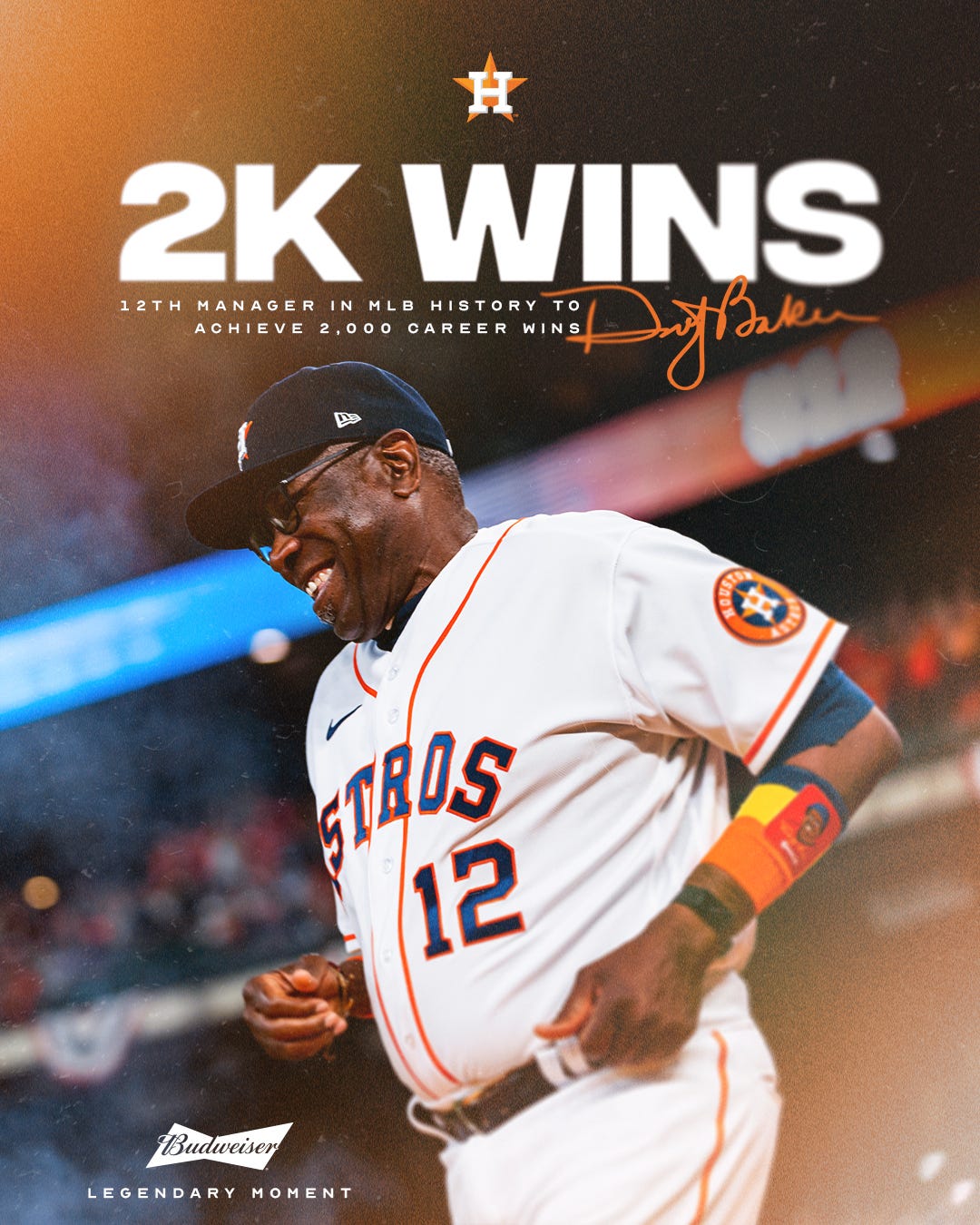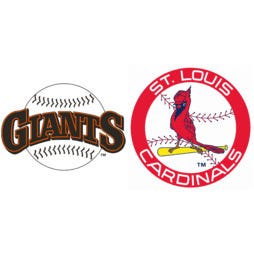Dusty Baker, 2,000 Wins, and Connections
The theme of Dusty Baker's career is connections. Both in his connections to so many in baseball over time, and his ability to connect to those who play for him.
It began with Geronimo Pena. In Dusty Baker’s first win (and game) as a major league manager, his Giants went to St. Louis to play the Cardinals. Pena started a double play in the top of first inning for the Cardinals and then singled to leadoff the bottom of the first.
In his 2,000 win, Pena’s son Jeremy played a vital role, driving in two with an RBI single and stealing a base (Pops was thrown out when he tried to steal in that game in 1993).1
This fun fact is remarkable, yet, when you think about it, unsurprising. There is a thread that connects Dusty’s first win to his 2,000. Yet when you manage over 3700 big league games over 25 seasons, connections appear all the time. And the story of Dusty Baker—and why he’s been able to manage his teams to 2,000 wins in over 3700 big league games—is the story of connections.
The lineup for Baker’s first games has many connections that follow from the zig-zagging paths of baseball careers. Batting 2nd for the Giants that day was Dave Martinez, the man who would succeed Baker as the manager of the Washington Nationals, 25 years later. Hall of Famer Ozzie Smith followed Pena in the Cardinals order. Gregg Jeffries hit cleanup for the Cardinals, who had entered baseball as a promising prospect from Junipero Serra High School, just outside San Francisco. And another Serra High grad also played in that game, Barry Bonds, who was also making his debut for the Giants.2
Of course, Baker’s connections across the game of baseball go back longer than to the 1993 season. Baker was a long-time major league outfielder, who played over 2000 games over 19 seasons. Skip could hit, as Baker finished his career with an OPS+ of 116. And that propelled him to 37.0 bWAR, which is tied for 620th best in MLB history.3
Baker’s career in the majors spans over a half-a-century, and in that time, what’s notable are the connections he represents, and made. In Baker’s playing debut, he pinch hit for future Hall of Famer Phil Niekro. Hank Aaron—Baker’s lifelong friend—was in right field and batting 3rd. Joe Torre, a future Hall of Famer manager played first and was the Braves cleanup hitter. Tito Francona played in that game. Francona did not manage, but his son Terry did, and still does in Cleveland. Jimmy Wynn played centerfield for the Astros—the Braves opponent—that day. Wynn and and Baker would be traded for each other seven years later, which sent Baker to the Dodgers.
Connections upon connections.
Ralph Garr—Baker’s lifelong friend—also played in that game, pinch hitting as well. Garr was in the stands last night sitting next to Baker’s wife and cheering on his lifelong friend to his 2,000 win.
That’s two mentions of lifelong friends that Baker made as a young player on the Braves. And that’s not a coincidence. Baker has been successful as a baseball manager, and has been hired by five different teams over 25 big league seasons because of his ability to make connections with people, especially his players.
Baker is renown for understanding people and what makes them tick. He runs smooth clubhouses, where public conflicts are rare and where players feel respected and understood. Media contretemps are reduced by this style of managing and things that happen in the clubhouse stay in the clubhouse. The advantage from a baseball standpoint from the managerial style—players can focus on playing baseball, rather than whatever controversy is playing out in the papers (well, in 1993) or on social media (in 2022).
For the Astros, Baker was hired by Jim Crane with this goal in mind. The Astros managerial job opened when Crane fired AJ Hinch after the revelations of the sign stealing scandal. Crane’s top priority was public relations—he needed to hire someone who shore up the reputation of his franchise in the light of massive (and in many ways unprecedented) media scrutiny. But Crane needed to focus on baseball too. He had a winning ball club coming off of three straight 100-win seasons and needed his players focused on baseball, not a constant barrage of media questions and the boos of opposing fans.
As fans, we often think of the job of a manager based on his tactical acumen—how they fill out the lineup card, when they use a pinch hitter and what decisions they make about when to pull a pitcher. And much commentary I see on Twitter, Facebook, and podcasts this season have focused on things like pinch hitting JJ Matejevic with 2 outs in the 9th innings of a one run game for his major league debut or hitting Niko Goodrum in prime spots in the order.
These decisions are of course part of the job of being a baseball manager. But the primary job of a baseball manager is to be a manager of men. His (and eventually her) job is to get his players to perform their best. And one essential tactic of modern managers—and the one that is often most prized by those who hire managers—is the ability to connect to players.
Connections.
It’s the story of Dusty Baker as a person, and the reason he’s been a successful major league manager. Congrats on 2,000, Skip.
Hat tip to Jake Kaplan, who posted this fact before last night’s game. Which is wild.
Now if I won 7 MVP awards and broke Mark McGwire and Henry Aaron’s home run records, I would undoubtedly be considered the greatest athlete in the history of my high school—St. Thomas in Houston. But Bonds may not be the best at his high school—Tom Brady also went to Junipero Serra High School.
To give further context, Baseball Reference identifies 22,635 different major leaguers throughout history. Baker is in the top 3% all time in bWAR.






